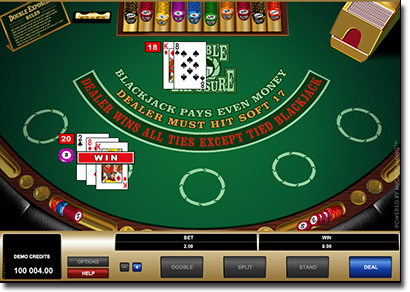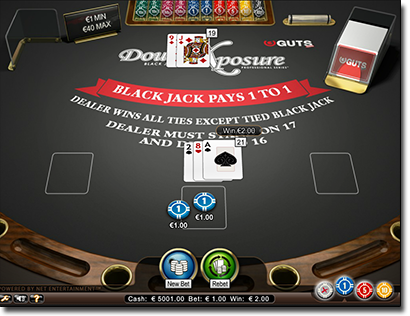
Double Exposure is a 21 variant that’s a little more favourable to players, therefore it’s difficult to find this game in a land based casino. Given its potentially profitable nature when proper strategies are utilised, it’s popular with dedicated blackjack players. It can be found at a majority of leading online casinos, including our favourites AllSlots.com and GDayCasino.com.
Read on to find out more about this exciting blackjack variant.
The rules of Double Exposure
Double Exposure blackjack gets its name from the fact that both of the dealer’s cards are face-up to all players. While this gives a huge advantage to the player, there are several other rules in place to even things out between the house and the player.
The house edge and odds vary depending on the particular rules in place.
Basics of the game
Double Exposure blackjack is true to the rules of the classic game in that the aim is to get a hand that’s closer to a value of 21 than the dealer, without going bust (getting a hand with a value over 21). It’s typically played using either six or eight standard decks of cards, with number cards (2 to 10) counting as their face value, aces counting as either one or 11, and J, Q, K counting as 10.
The dealer deals two face-up cards to each player at the table, starting from the dealers left, before dealing their own two face-up cards for all players to see. Players then chose to stand, hit, split or double-down and if your hand is closer to 21 than the dealer, you’re a winner.
Rules
The rules of Double Exposure can vary depending on the game at hand, but the standard basic rules are:
- A player blackjack win is paid at 1:1, unlike classic blackjack which typically pays 3:2, which has a significant impact on the players chance to profit
- The dealer wins on all tie bets except for a tied blackjack (player blackjack beats dealer blackjack)
- A player can hit on any hand valued at less than 21
- A player can stand on any hand valued at 21 or less
- A hand automatically stands when the card value is 21
- Blackjack beats any other hand with a value of 21
- Insurance is not offered
- Players have the choice to stand, hit, split or double-down
Additional rules change from game to game, so always check the rules of the game you’re playing before committing to any real money bets.
As an example, below are the rules for Microgaming’s Double Exposure Blackjack.
International players can find this games at online casinos like All Slots, Royal Vegas and Jackpot City.
- The dealer must hit on soft 17
- Double down is allowed on hard nine, 10 and 11
- Double down is allowed after a split
- A split is allowed three times to make a total of four hands
- Aces are allowed to be re-split
- Only one card is allowed to split Aces
- Unlike cards with a value of 10 are allowed to be split
- In a split hand, a hand of ace and 10 counts as a value of 21 and not a blackjack
Double Exposure strategy
For Double Exposure blackjack to be truly advantageous to the player, careful gameplay and strategic moves must be adhered to. For the most part, basic blackjack strategy will apply, while you can locate specific Double Exposure strategy charts online for recommendations of whether to hit, stand, split or double-down on any given hand.
We recommend reading our article on basic blackjack strategy for more information.
Where to play Double Exposure blackjack online
Double Exposure is a popular variant of 21, but you may not find it at land-based Australian casinos. Unfortunately, Australian’s won’t be able to find it online as of September 2017 due to legislative changes.
International players will find it at secure blackjack sites including;

